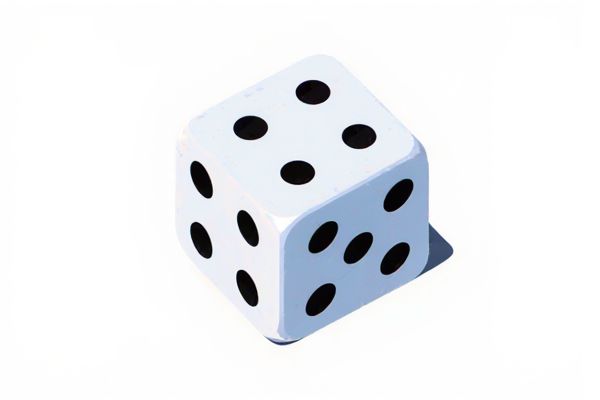
Generate random dice results instantly with our easy-to-use online tool, designed specifically for dice ranging from 1 to 3. Experience seamless, fair, and quick number generation for games, decision-making, or creative activities without any hassle. Maximize your fun and efficiency by relying on this reliable dice generator to produce unbiased outcomes every time.
Online tool for random dice generator 1-3
Discover our random dice generator with samples ranging from 1 to 3, ready for immediate use and randomization. You can easily enter your own list to customize the results. With a single click, receive a randomized list and one value for your needs.Data Source
Single Result
Multiple Results
Understanding the 1-3 Random Dice Generator
A 1-3 random dice generator produces outcomes limited to the numbers 1, 2, and 3, simulating a three-sided die for probability or gaming applications. It uses algorithms or physical mechanisms to ensure uniform randomness across the three possible results, maintaining fair chances for each number. Understanding this generator involves grasping how probability distribution is maintained evenly and how the randomization process impacts game dynamics or statistical sampling.
Key Features of a 1-3 Dice Roller
A 1-3 dice roller offers quick and accurate random number generation within the limited range of one to three, ensuring fairness in games or decision-making. Its compact design often includes intuitive user interfaces with single-button operation and instant result display. Enhanced features may include customizable roll animations, adjustable roll speed, and integration with digital platforms for seamless gameplay.
Applications for 1-3 Random Dice Generators
Random dice generators for values 1-3 find key applications in low-stake gaming environments, educational tools, and decision-making processes where simplicity and rapid results are essential. These generators efficiently simulate outcomes for quick probability scenarios, aid in teaching basic statistics and randomness, and streamline choices in game development or everyday problem-solving. Their lightweight algorithms ensure seamless integration into digital platforms requiring minimal resource consumption.
Benefits of Using 1-3 Dice Generators in Games
Using a 1-3 random dice generator enhances game dynamics by introducing controlled variability, ensuring fairness in game outcomes. It simplifies decision-making processes, especially in board games and RPGs, by limiting range while maintaining unpredictability. This focused range reduces complexity, speeding up gameplay and improving player engagement.
Popular Algorithms for 1-3 Dice Generation
Popular algorithms for generating random dice rolls from 1 to 3 include the Linear Congruential Generator (LCG), which offers simplicity and speed, and the Mersenne Twister, known for its high-quality randomness and long period. Another common method is the use of cryptographically secure pseudo-random number generators (CSPRNGs) like the Fortuna or the ChaCha-based algorithms, ensuring unpredictability in applications requiring enhanced security. These algorithms efficiently map generated numbers to the discrete set {1, 2, 3}, often using modular arithmetic to maintain uniform distribution.
Testing Fairness in 1-3 Dice Randomizers
Testing fairness in 1-3 dice randomizers requires statistical analysis of outcome distributions to ensure each number (1, 2, or 3) appears approximately one-third of the time. Chi-square tests or frequency analysis over large sample sizes validate the uniformity and absence of bias in the random number generator. Ensuring fairness is critical for applications in games or simulations where unpredictable and equitable results are essential.
Comparing Digital and Physical 1-3 Dice
Digital 1-3 dice generators use algorithms to produce random numbers, ensuring unbiased results with instant outcomes, while physical dice rely on tactile interaction and physics, offering a tangible gaming experience. Digital dice can be integrated into apps or games, providing convenience and repeatability, whereas physical dice require no power source and add a sensory element that some users prefer for fairness perception. Both methods have unique advantages; digital excels in speed and accessibility, while physical dice maintain traditional authenticity and player engagement.
Security Considerations for Online Dice Rollers
Online dice rollers generating results between 1 and 3 must implement robust encryption protocols to safeguard against data interception and manipulation during transmission. Using cryptographically secure pseudorandom number generators (CSPRNGs) ensures fair and unpredictable outcomes, preventing user exploitation or bias. Regular security audits and transparent algorithms enhance trust by verifying the integrity and fairness of the dice roll results.
Top Online Tools for Random 1-3 Dice Rolls
Top online tools for random dice rolls focused on 1-3 sides provide fast, accurate, and unbiased results essential for gaming and decision-making. These platforms utilize advanced algorithms to simulate fair outcomes, ensuring each roll from 1 to 3 has an equal probability. Popular examples include Random.org Dice Roller, Calculator Soup Dice Generator, and Rolz.org customized dice options tailored for specific game scenarios.
Future Trends in Digital Dice Generation
Future trends in digital dice generation from 1 to 3 focus on AI-enhanced algorithms that increase randomness and fairness in gaming outcomes. Integration of blockchain technology ensures transparent, tamper-proof results for online platforms, enhancing player trust. Advances in mobile app development and AR interfaces provide immersive experiences, transforming traditional dice rolling into interactive digital encounters.
 azrandom.com
azrandom.com